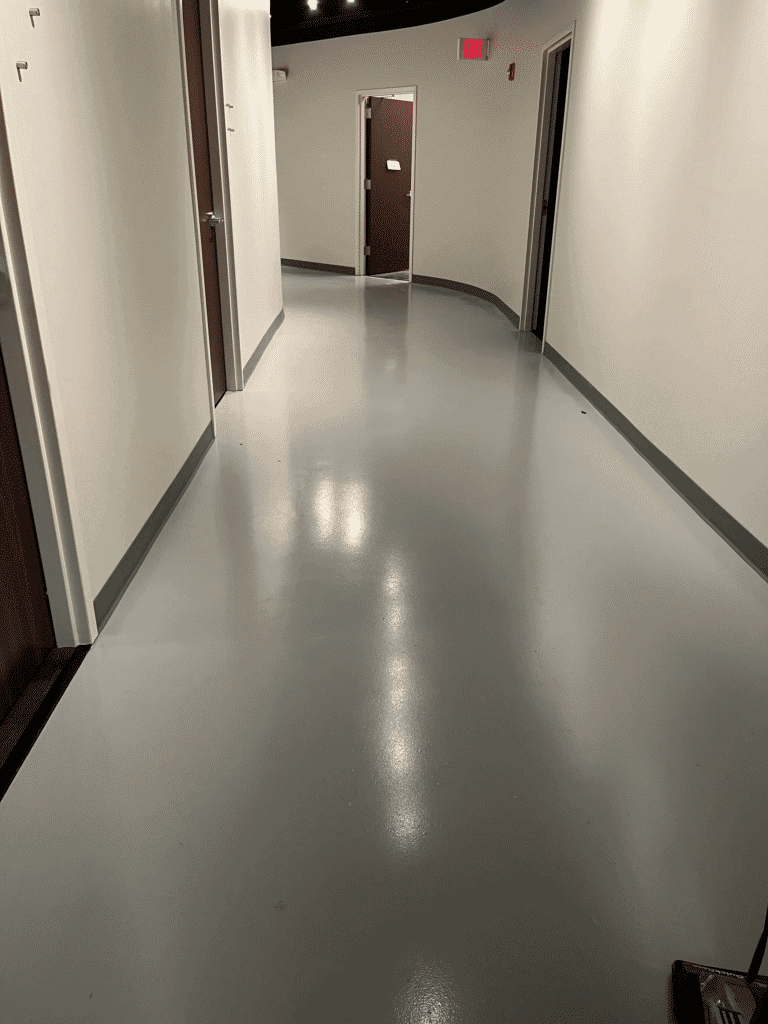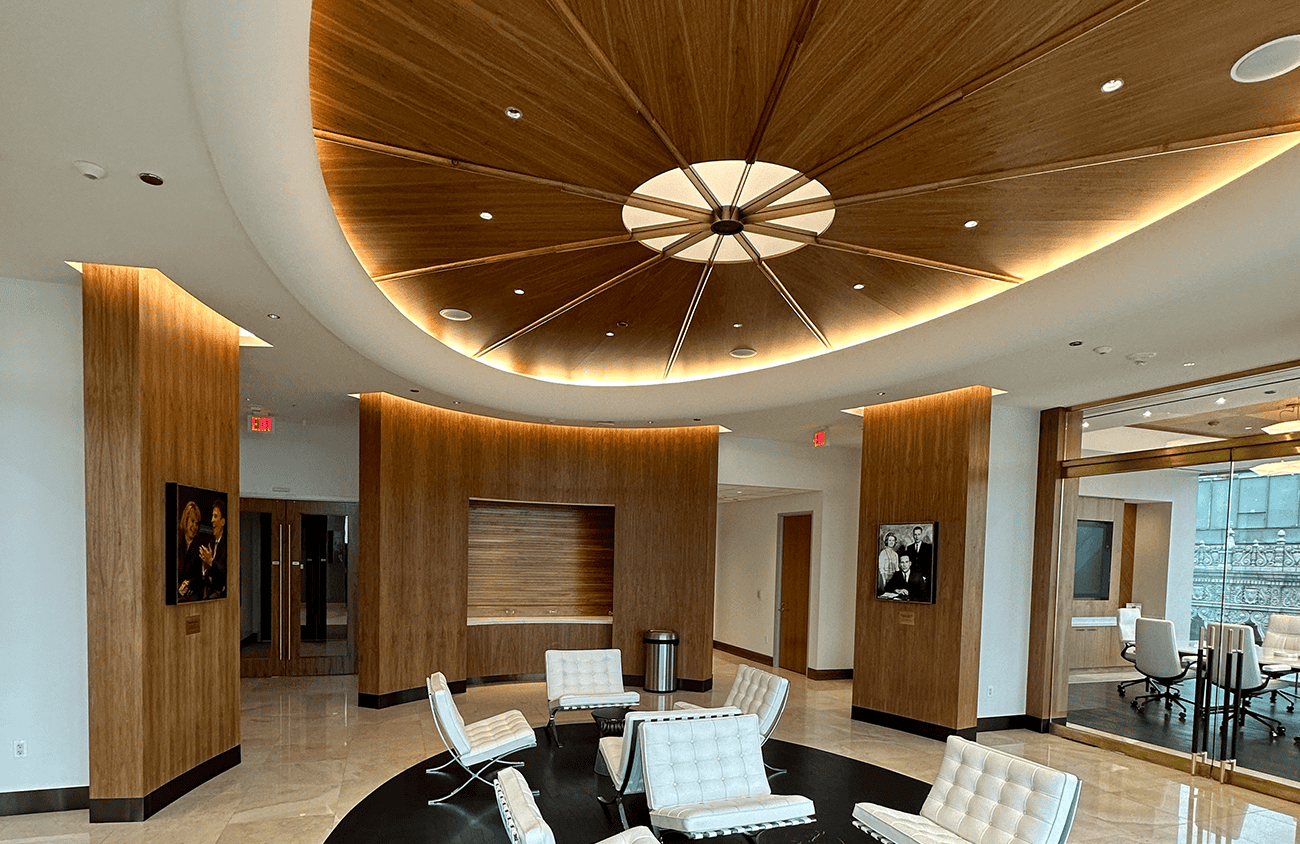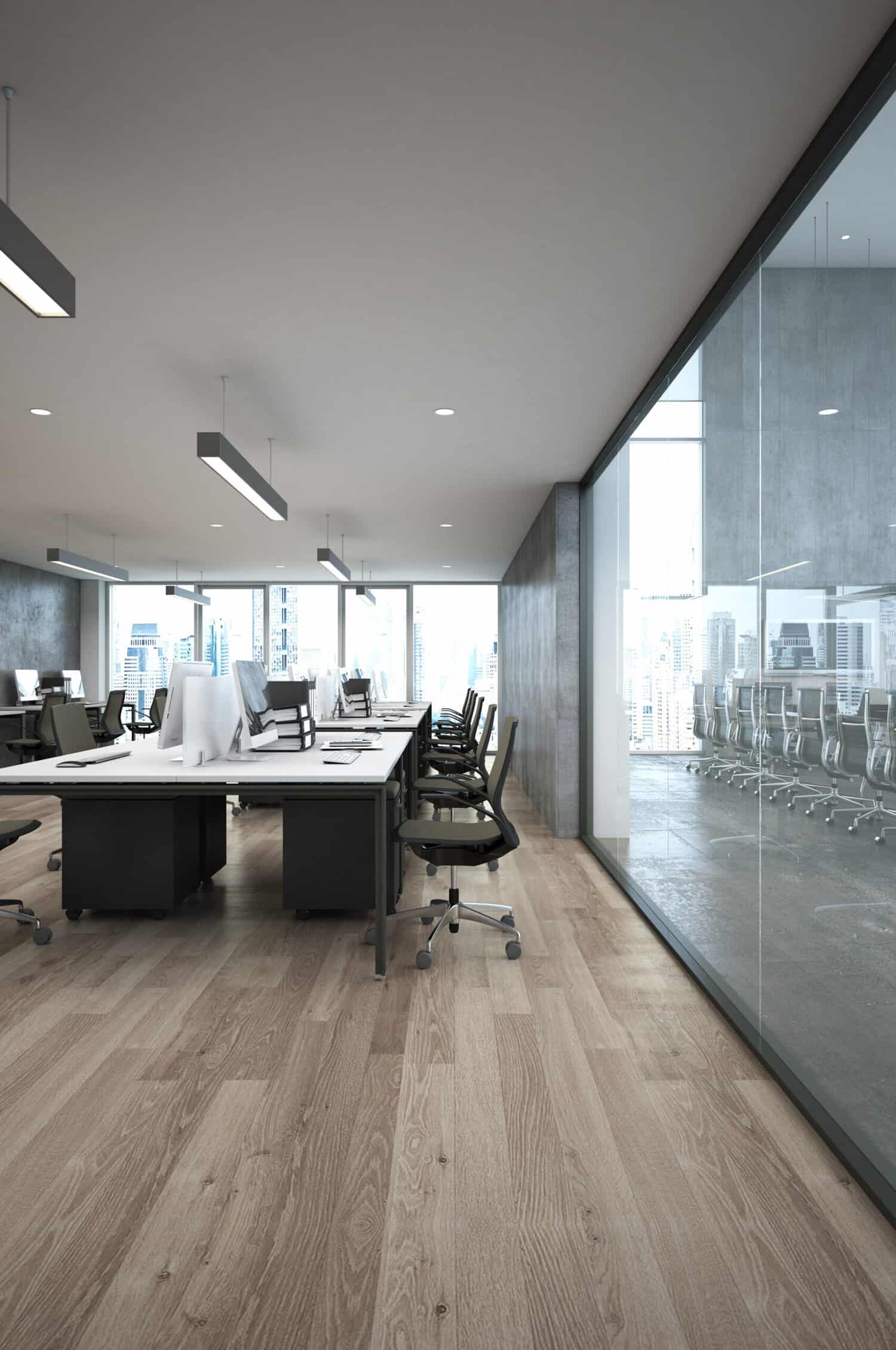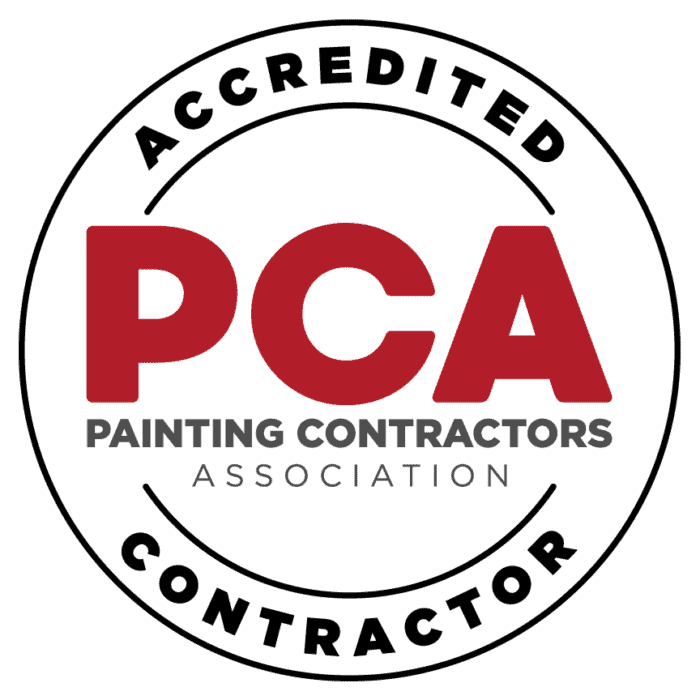Office walls take a beating—especially in busy spaces like hallways, conference rooms, and shared workstations. Scuff-resistant paint promises longer-lasting finishes, less maintenance, and fewer touch-ups. But is it really worth the extra investment?
This guide breaks down what makes scuff-resistant paint different, how it performs in commercial environments, and whether it’s a smart financial and aesthetic decision for your office.
Section 1: What Is Scuff-Resistant Paint?
Scuff-resistant paint is formulated to hold up against wear and tear in busy environments. Unlike traditional paints, which can easily show marks after contact, these paints are built tough.
What makes them different?
-
Cross-linking resins or ceramic microspheres are often added to create a dense, durable finish.
-
They form a harder film that resists abrasion.
-
The surface can withstand frequent contact from bags, furniture, cleaning tools, or rolling carts.
-
Designed to stay looking clean longer with less maintenance.
Comparison to Standard Interior Paints
| Feature | Scuff-Resistant Paint | Traditional Interior Paint |
|---|---|---|
| Surface Hardness | High | Medium |
| Abrasion Resistance | Excellent | Moderate to Low |
| Cleaning Tolerance | Strong – withholds scrubbing | Moderate – may degrade over time |
| Sheen Options | Eggshell to Semi-gloss | Flat, eggshell, satin, semi-gloss |
Available Product Examples
Here are a few trusted scuff-resistant paints commonly used in commercial settings:
-
Benjamin Moore Scuff-X – Designed specifically for high-traffic commercial spaces
-
Sherwin-Williams Duration Home – Offers advanced stain resistance and durability
-
BEHR Scuff Defense – Offers enhanced durability with lower price point
These products are available in a wide range of colors and finishes and are compatible with most standard primers.
Common Wall Problems in Office Environments

Where Scuffs Happen Most
Even the most carefully planned office layouts can’t avoid wall contact. The busiest areas tend to show wear first:
-
Hallways and corridors
-
Mailrooms and break rooms
-
Conference and meeting rooms
-
Behind chairs and near baseboards
-
Entryways and elevator lobbies
Causes of Damage
Scuffs and damage are usually caused by everyday activities. Some of the most common culprits include:
-
Rolling chairs or carts scraping along walls
-
Bags or backpacks bumping into surfaces
-
High heels, hard-soled shoes, and boots brushing baseboards
-
Cleaning tools rubbing paint thin during routine janitorial tasks
-
Equipment movement during office reconfigurations
Visual & Operational Impact
Damaged paint might seem like a small problem—but it adds up quickly.
Worn walls can negatively affect first impressions. Clients may view them as signs of neglect. Employees may feel less pride in the space. And from a maintenance perspective, constant touch-ups eat into budgets and staff time. In extreme cases, walls need full repainting every year or two—especially in large shared spaces. That’s time, money, and productivity lost.
How Scuff-Resistant Paint Performs in Real Offices
Durability Under Daily Use
Scuff-resistant paints were made for real-world wear and tear.
In high-use environments like open offices, coworking spaces, or retail-adjacent offices, they show noticeable durability:
-
Less black marking from shoes or carts
-
Fewer smudges and surface abrasions
-
Maintains color and finish longer than standard paint
It won’t prevent every single mark—but you’ll see a lot fewer of them.
Cleaning and Maintenance
The biggest value of scuff-resistant paint? It stands up to cleaning.
Daily or weekly wipe-downs with disinfectants, microfiber cloths, or even mild degreasers don’t wear through the finish as quickly. Janitorial staff can keep walls looking good without damaging the paint, meaning:
-
Less frequent touch-up painting
-
Lower cleaning supply costs
-
Less disruption to business operations
In many cases, businesses that used to touch up walls every 6 months can extend that to 18–24 months.
Real-World Example
One commercial client—a regional law firm located in a downtown high-rise—switched to Benjamin Moore Scuff-X in all their hallways and reception areas.
Before:
-
Frequent touch-ups every 8–10 months
-
Painters scheduled after hours to avoid disrupting clients
-
Staff reported walls looking “tired” halfway through the year
After:
-
No repainting needed in 2 years
-
Significant drop in complaints about hallway appearance
-
Staff noticed walls looked cleaner despite the same cleaning routine
While this isn’t a universal result, it shows how scuff-resistant paint performs when used strategically.
Cost Considerations and ROI
Upfront Cost Differences
Scuff-resistant paints aren’t cheap. Expect to pay about 30–60% more per gallon compared to mid-grade traditional paint.
However, the labor cost remains the same. Painters don’t need special tools or techniques. The application process mirrors any standard interior paint job—brush, roll, or spray.
If your budget is tight, applying scuff-resistant paint only in high-traffic zones may still yield major benefits.
Long-Term Value
| Cost Element | Standard Paint | Scuff-Resistant Paint |
|---|---|---|
| Material Cost | Lower | Higher |
| Repaint Frequency (5 years) | 2–3 times | 1–2 times |
| Touch-up Labor | Frequent | Minimal |
| Cleaning Supply Use | Moderate | Lower |
| Business Disruption | High | Reduced |
In offices with heavy foot traffic or client visibility, these numbers often translate into real savings within 3–5 years.
You’ll likely repaint less often, save on materials, and reduce off-hours labor scheduling.
Other Cost Factors
-
Downtime matters: Having to schedule repainting during weekends or evenings adds hidden costs.
-
Consistent appearance leads to better experiences for tenants and customers.
-
Fewer complaints from employees and visitors—because walls just look better, longer.
Where to Use It (and Where You Might Not Need It)

Best Areas for Scuff-Resistant Paint
Not every wall needs scuff-resistant paint—but high-traffic zones do. Focus first on the areas that experience the most wear. Hallways, entryways, and shared corridors are under constant use by employees, guests, and deliveries. These walls are routinely bumped by bags, chairs, or cleaning equipment. In reception or waiting areas, appearances matter. A clean, polished look helps convey professionalism—and durable, low-VOC scuff-resistant paint helps maintain it over time.
Communal spaces like break rooms, kitchenettes, and frequently booked conference rooms also benefit. These areas are subject to spills, scuffs, and furniture movement, making them ideal for higher-durability coatings. Shared walls in coworking setups or flexible desk environments get even more contact. A tougher finish in these spaces can reduce maintenance and preserve aesthetics with fewer interruptions.
Where Traditional Paint Might Suffice
In contrast, not every area needs premium-grade protection. Executive suites or private offices often see lighter use, with minimal foot traffic or wall contact. In these cases, a high-quality standard interior paint—especially a low-VOC option—can perform just fine.
Other low-impact zones include ceilings, upper wall sections, IT closets, and storage rooms. These surfaces are rarely touched or bumped, making traditional paint a practical and budget-friendly choice.
A Smart Hybrid Approach
Many offices benefit from a hybrid strategy. Use scuff-resistant paint in visible, high-use areas to cut down on touch-ups and cleaning. Apply traditional paint in low-impact zones to stretch your budget. This mix works especially well in multi-use facilities—like schools, clinics, or multi-tenant offices—where traffic levels vary by room. It’s a targeted way to protect what matters most without overspending.
Choosing the Right Product and Finish
Paint Sheens That Hide or Show Scuffs
Choosing the right sheen is just as important as choosing the paint.
-
Eggshell or satin: Ideal for most offices. Strikes a balance between durability and low reflectivity.
-
Flat or matte: Hides imperfections best but is harder to clean and less durable.
-
Semi-gloss: Extremely durable, but can be too shiny for modern offices unless used in restrooms or utility spaces.
VOCs and Indoor Air Quality
Most commercial-grade scuff-resistant paints are now low-VOC or zero-VOC, and many carry certifications like GREENGUARD Gold.
They’re safe for use in occupied buildings and don’t release strong odors—important for offices that operate 24/7 or have sensitive staff.
Matching Colors to Your Brand
Paint manufacturers offer full color matching, including custom brand palettes. That means you can:
-
Reinforce brand identity with consistent colors
-
Maintain clean, scuff-free feature walls
-
Avoid repainting due to visible wear on bold accent tones
Smart Business Owner FAQs
“Can it be used over existing paint?”
Yes. As long as the surface is clean, dry, and in good condition, scuff-resistant paint can be applied right over existing coatings.
If the old paint is glossy or uneven, a light sanding or priming step is recommended.
“Is it worth it for a leased office space?”
If your lease is three years or longer—or your office serves walk-in clients—it’s worth considering.
Reducing repainting cycles may also reduce tenant responsibility for end-of-lease repairs.
“Can janitorial staff maintain it easily?”
Absolutely. Most products are made to be cleaned with:
-
Microfiber cloths
-
Non-abrasive detergents
-
Standard disinfectants
No specialty cleaning tools are required, and walls hold up well with routine maintenance.
“Does it really resist scuffing?”
Yes—though no paint is 100% scuff-proof.
Independent testing, including ASTM D2486 scrub resistance, shows scuff-resistant paints outperform standard products by a wide margin in durability, cleanability, and wear.
For businesses tired of repainting or touching up every few months, the upgrade is noticeable.
Conclusion
For high-touch, high-traffic zones, scruff-resistant paint can preserve your office’s professional image while reducing both costs and stress over time Yes, the upfront price is higher. But the long-term return—fewer repaints, cleaner walls, lower labor costs—is often well worth it.
If your office walls are starting to show their age—or you’re simply tired of scheduling constant touch-ups—scuff-resistant paint could be the solution. Reach out today for a free commercial paint consultation. We’ll evaluate your space, recommend the right product for your traffic levels, and help you extend the life and look of your walls.





